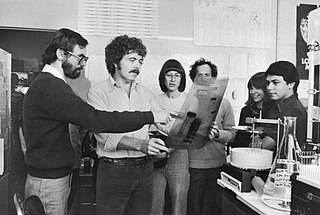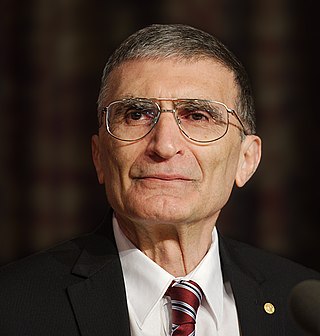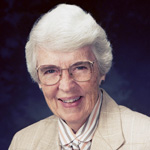
Herbert Wayne "Herb" Boyer is an American biotechnologist, researcher and entrepreneur in biotechnology. Along with Stanley N. Cohen and Paul Berg, he discovered recombinant DNA, a method to coax bacteria into producing foreign proteins, which aided in jump-starting the field of genetic engineering.

The University of Texas Southwestern Medical Center is a public academic health science center in Dallas, Texas. With approximately 23,000 employees, more than 3,000 full-time faculty, and nearly 4 million outpatient visits per year, UT Southwestern is the largest medical school in the University of Texas System and the State of Texas.

TheUniversity of Texas Health Science Center at San Antonio, doing business as UT Health San Antonio, is a public academic health science center in San Antonio, Texas. It is part of the University of Texas System.

Bruce Michael Alberts is an American biochemist and the Emeritus Chancellor’s Leadership Chair in Biochemistry and Biophysics for Science and Education at the University of California, San Francisco. He has done important work studying the protein complexes which enable chromosome replication when living cells divide. He is known as an original author of the "canonical, influential, and best-selling scientific textbook" Molecular Biology of the Cell, as an Editor-in-Chief of Science magazine. He was awarded the National Medal of Science for "intellectual leadership and experimental innovation in the field of DNA replication, and for unparalleled dedication to improving science education and promoting science-based public policy" in 2014.

Aziz Sancar is a Turkish molecular biologist specializing in DNA repair, cell cycle checkpoints, and circadian clock. In 2015, he was awarded the Nobel Prize in Chemistry along with Tomas Lindahl and Paul L. Modrich for their mechanistic studies of DNA repair. He has made contributions on photolyase and nucleotide excision repair in bacteria that have changed his field.
Jeffrey Lynn Bennetzen is an American geneticist on the faculty of the University of Georgia (UGA). Bennetzen is known for his work describing codon usage bias in yeast, and E. coli; being the first to clone and sequence an active transposon in plants, discovering that most of the DNA in plant genomes was a particular class of mobile DNA (LTR-retrotransposons); solving the C-value paradox; proposing sorghum and Setaria as model grasses; showing that rice centromeres were hotspots for recombination, but not crossovers; and developing a technique to date polyploidization events. He is an author, with Sarah Hake of the book "Handbook of Maize." Bennetzen was elected to the US National Academy of Sciences in 2004.
Charles Thomas Caskey, also known as C. Thomas Caskey, was an American internist who has been a medical Geneticist and biomedical researcher and entrepreneur. He was a Professor of Molecular and Human Genetics at Baylor College of Medicine, and served as editor of the Annual Review of Medicine from 2001 to 2019. He was a member of the editorial boards of the Proceedings of the National Academy of Sciences, Science, the Encyclopedia of Molecular Medicine and numerous other medical and scientific journals.
Kenneth Breslauer, born in 1947 in Jönköping, Sweden, is the Linus C. Pauling Distinguished Professor of Chemistry and Chemical Biology at Rutgers University. He is the Founding Dean of the Division of Life Sciences and served as vice president for Health Science Partnerships. Kenneth Breslauer's research focuses on defining and characterizing the molecular forces that control communication between biological molecules, particularly those interactions that modulate and control gene expression, DNA damage repair, mutagenesis, and drug binding. Breslauer arrived at the university as an assistant professor in 1974.
The Wiley Prize in Biomedical Sciences is intended to recognize breakthrough research in pure or applied life science research that is distinguished by its excellence, originality and impact on our understanding of biological systems and processes. The award may recognize a specific contribution or series of contributions that demonstrate the nominee's significant leadership in the development of research concepts or their clinical application. Particular emphasis will be placed on research that champions novel approaches and challenges accepted thinking in the biomedical sciences.

Errol Clive Friedberg was a biologist and historian of science in the Department of Pathology at Stanford University and subsequently the University of Texas Southwestern Medical Center.
Zhijian "James" Chen is a Chinese-American biochemist and professor in the department of molecular biology at University of Texas Southwestern Medical Center. He is best known for his discovery of mechanisms by which nucleic acids trigger innate and autoimmune responses from the interior of a cell, work for which he received the 2019 Breakthrough Prize in Life Sciences.

Douglas Cecil Wallace is a geneticist and evolutionary biologist at the University of Pennsylvania and the Children's Hospital of Philadelphia in Pennsylvania. He pioneered the use of human mitochondrial DNA as a molecular marker.

Leona D. Samson is the Uncas and Helen Whitaker Professor and American Cancer Society Research Professor of Biological Engineering at the Massachusetts Institute of Technology, where she served as the Director of the Center for Environmental Health Sciences from 2001 to 2012. Before her professorship at MIT, she held a professorship at the Harvard School of Public Health. She is on the editorial board of the journal DNA Repair. Her research interests focus on "methods for measuring DNA repair capacity (DRC) in human cells", research the National Institute of Health recognized as pioneering in her field, for which the NIH granted her the National Institutes of Health Director's Pioneer Award.
Cathy H. Wu is the Edward G. Jefferson Chair and professor and director of the Center for Bioinformatics & Computational Biology (CBCB) at the University of Delaware. She is also the director of the Protein Information Resource (PIR) and the North east Bioinformatics Collaborative Steering Committee, and the adjunct professor at the Georgetown University Medical Center.

Sandra Louise Schmid is the first Chief Scientific Officer of the Chan Zuckerberg Biohub. She is a Canadian cell biologist by training; prior to her move to CZ Biohub, she was Professor and Chair of the Cell Biology Department at the University of Texas Southwestern Medical Center. Throughout her academic career, she has authored over 105 publications on the molecular mechanism and regulation of clathrin-mediated endocytosis and the structure and function of the GTPase dynamin and mechanisms governing membrane fission. She was the first to identify dynamin's key role in endocytosis. She is a co-founder of the journal Traffic and has been the Editor-in-Chief of Molecular Biology of the Cell, and the President of the American Society for Cell Biology.

Eleanor Anne Young was a Catholic religious sister, research scientist, and educator. She was inducted into the Texas Women's Hall of Fame in 1994.

Paolo Casali is an Italian-American immunologist. He is the Zachry Foundation Distinguished Professor at the Long School of Medicine of the University of Texas Health Science Center at San Antonio, and chairman of its department of microbiology, immunology and molecular genetics.
Lumír Krejčí is a Czech biochemist. His research is focused on regulatory processes involved in maintaining genome integrity. Currently, as Associate Professor in biochemistry, he leads the laboratory of recombination and DNA repair (LORD) at the Department of Biology, Faculty of Medicine, at Masaryk University in Brno.
Anindya Dutta is an Indian-born American biochemist and cancer researcher, a Chair of the Department of Genetics at the University of Alabama at Birmingham School of Medicine since 2021, who has served as Chair of the Department of Biochemistry and Molecular Genetics at the University of Virginia School of Medicine in 2011–2021. Dutta's research has focused on the mammalian cell cycle with an emphasis on DNA replication and repair and on noncoding RNAs. He is particularly interested in how de-regulation of these processes promote cancer progression. For his accomplishments he has been elected a Fellow of the American Association for the Advancement of Science, received the Ranbaxy Award in Biomedical Sciences, the Outstanding Investigator Award from the American Society for Investigative Pathology, the Distinguished Scientist Award from the University of Virginia and the Mark Brothers Award from the Indiana University School of Medicine.
Agata Smogorzewska is a Polish-born scientist. She is an associate professor at Rockefeller University, heading the Laboratory of Genome Maintenance. Her work primarily focuses on DNA interstrand crosslink repair and the diseases resulting from deficiencies in this repair pathway, including Fanconi anemia and karyomegalic interstitial nephritis.










